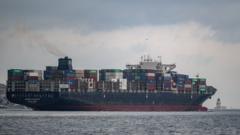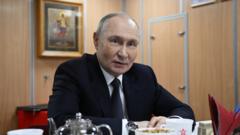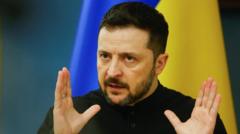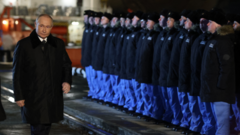In a significant diplomatic development, Russia and Ukraine have agreed to a naval ceasefire in the Black Sea as part of separate agreements with the United States. This move seeks to restore key shipping lanes while addressing ongoing tensions between the nations.
Naval Ceasefire Reached Between Russia and Ukraine in the Black Sea

Naval Ceasefire Reached Between Russia and Ukraine in the Black Sea
Russia and Ukraine agree to a naval ceasefire following US-mediated talks in Saudi Arabia, aimed at reopening crucial trade routes.
Both sides have committed to ensuring a "durable and lasting peace" through cooperation on energy infrastructure protection. However, Russia insists the ceasefire hinges on lifting sanctions related to its food and fertiliser trade. Ukrainian President Zelensky acknowledged the ceasefire as a positive step, despite expressing skepticism about its immediate effectiveness. Meanwhile, tensions remain high with accusations of violations and new military actions reported.
The agreements, which arose from two days of negotiations, reflect ongoing efforts to balance trade interests while maintaining national security. Nonetheless, the situation remains fluid as both sides aim to navigate this complex landscape.
Russia and Ukraine have reached a significant agreement for a naval ceasefire in the Black Sea, facilitating crucial international shipping routes. Following two days of US-mediated negotiations in Saudi Arabia, both nations expressed commitment toward a lasting peace. The White House announced that parties would work together to enforce a ban on attacking energy infrastructures, though the Kremlin clarified that the ceasefire would only be enacted once certain sanctions against Russia's agricultural trade were lifted.
Ukrainian President Volodymyr Zelensky hailed the ceasefire as a "step in the right direction," stressing the need for continuous efforts towards sustainable peace. He expressed concern that the U.S. might be compromising Ukraine’s interests as Washington considers easing sanctions that could stabilize Russia's food export economy. In response, Zelensky indicated that Ukraine could pursue increased sanctions and military support if Russia failed to uphold its end of the agreements.
The discussions also underscored long-standing tensions, as Russia initiated missile strikes during the peace talks, injuring multiple individuals in Ukraine. Ukrainian Defence Minister Rustem Umerov warned against any violation by Russian warships in the Black Sea, emphasizing that Ukraine would retain the right to self-defence if necessary.
Recent history shows a complicated interplay in the region, with prior agreements allowing safe passage for commercial ships being undermined by Russia's withdrawal from the "Black Sea grain deal" in July 2023. This past agreement had initially aimed to enable the export of agricultural products, signaling the stakes tied to supply chain stability.
The path forward remains uncertain, as both sides grapple with a mix of diplomatic dialogue and military action.
The agreements, which arose from two days of negotiations, reflect ongoing efforts to balance trade interests while maintaining national security. Nonetheless, the situation remains fluid as both sides aim to navigate this complex landscape.
Russia and Ukraine have reached a significant agreement for a naval ceasefire in the Black Sea, facilitating crucial international shipping routes. Following two days of US-mediated negotiations in Saudi Arabia, both nations expressed commitment toward a lasting peace. The White House announced that parties would work together to enforce a ban on attacking energy infrastructures, though the Kremlin clarified that the ceasefire would only be enacted once certain sanctions against Russia's agricultural trade were lifted.
Ukrainian President Volodymyr Zelensky hailed the ceasefire as a "step in the right direction," stressing the need for continuous efforts towards sustainable peace. He expressed concern that the U.S. might be compromising Ukraine’s interests as Washington considers easing sanctions that could stabilize Russia's food export economy. In response, Zelensky indicated that Ukraine could pursue increased sanctions and military support if Russia failed to uphold its end of the agreements.
The discussions also underscored long-standing tensions, as Russia initiated missile strikes during the peace talks, injuring multiple individuals in Ukraine. Ukrainian Defence Minister Rustem Umerov warned against any violation by Russian warships in the Black Sea, emphasizing that Ukraine would retain the right to self-defence if necessary.
Recent history shows a complicated interplay in the region, with prior agreements allowing safe passage for commercial ships being undermined by Russia's withdrawal from the "Black Sea grain deal" in July 2023. This past agreement had initially aimed to enable the export of agricultural products, signaling the stakes tied to supply chain stability.
The path forward remains uncertain, as both sides grapple with a mix of diplomatic dialogue and military action.




















